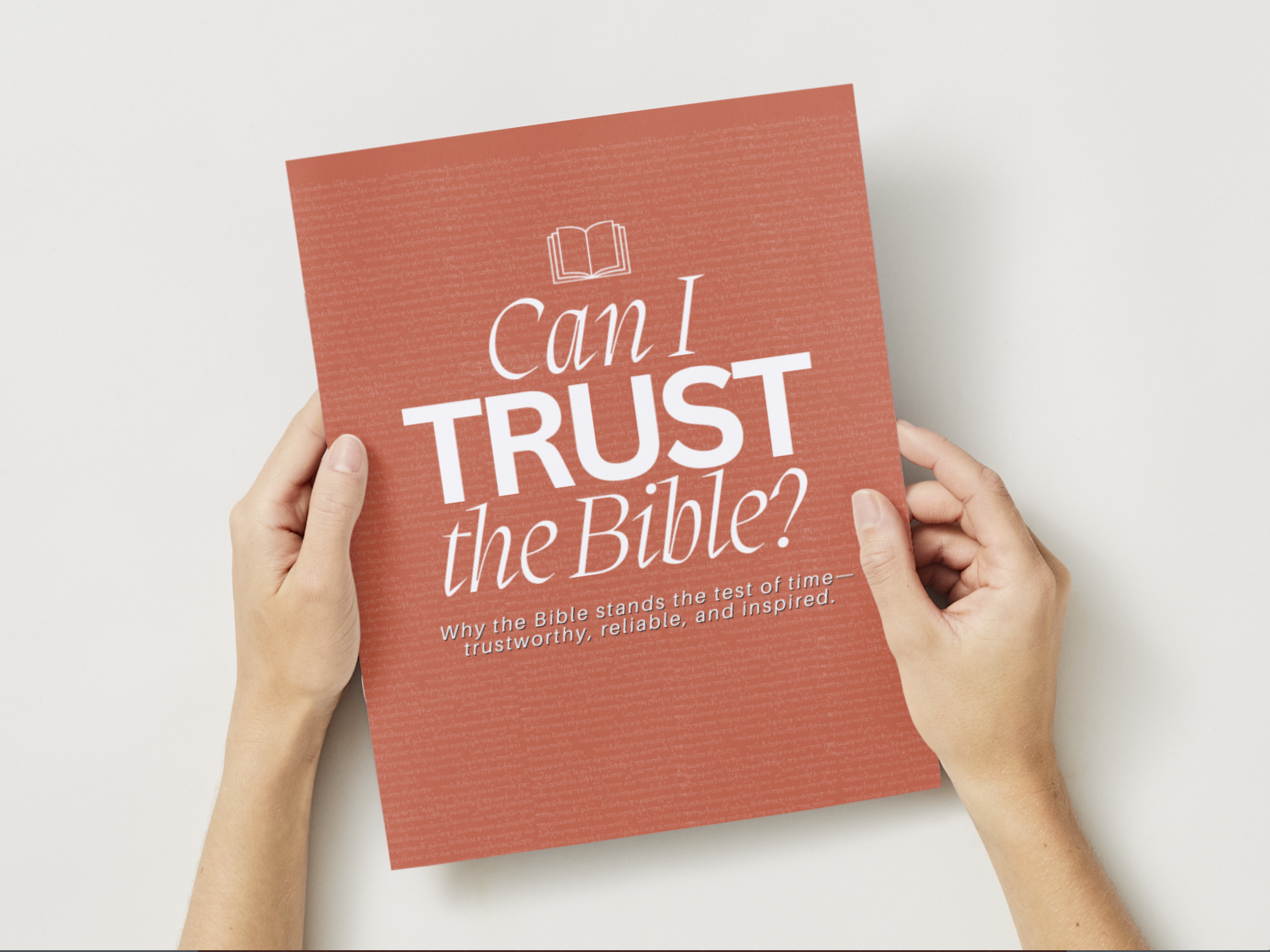 Image 1 of 5
Image 1 of 5

 Image 2 of 5
Image 2 of 5

 Image 3 of 5
Image 3 of 5

 Image 4 of 5
Image 4 of 5

 Image 5 of 5
Image 5 of 5






"Can I Trust the Bible?" Small Group Workbook
PRODUCT STATUS: PRE-ORDER (SHIPS NOVEMBER 1)
Do you ever wonder… Can I really trust the Bible?
This workbook answers that question with clarity, depth, and conviction. Blending biblical teaching, historical evidence, and engaging study questions, Can I Trust the Bible? equips you to stand firm in your faith and share it with others. Perfect for personal devotions, small group studies, or classroom settings, it’s designed to help you:
Build unshakable confidence in Scripture’s truth.
Gain practical tools to answer common questions about the Bible’s reliability.
Deepen your personal faith while fostering meaningful discussion in a group.
Whether you’re leading a study, discipling others, or simply strengthening your own foundation, this resource is an invitation to encounter God’s Word as living, trustworthy, and transformative.
Why You’ll Love This Workbook
Personal Value: Strengthen your faith with historical, prophetic, and textual evidence that confirms the Bible’s truth.
Practical Function: Includes structured lessons, key insights, and reflection/discussion questions for personal study or small groups.
Accessible & Engaging: Written in clear, conversational language—no seminary degree required.
Multi-use Format: Perfect for small groups, Sunday school, youth ministry, or one-on-one discipleship settings.
Developed from an in-person workshop taught by Spencer Records, this workbook simplifies complex theological concepts and makes them approachable without sacrificing depth. Through thought-provoking lessons, historical evidence, fulfilled prophecy, and interactive reflection questions, you will walk away not only knowing why the Bible can be trusted, but also how to confidently share that trust with others.
Outline of Main Sections
Part 1: The Inspiration of the Bible
What makes the Bible unique among all books.
Historical evidence outside Scripture confirming the life of Jesus.
Fulfilled prophecies that point directly to Christ.
The harmony of the Old and New Testaments.
Part 2: The Reliability of the Bible
How ancient scribes copied Scripture with extraordinary accuracy.
The discovery of the Dead Sea Scrolls and their importance.
Understanding textual variants and why they don’t undermine doctrine.
Confidence in the preservation of God’s Word.
Part 3: The Canonization of the Bible
How the books of the Bible were recognized, not chosen.
Criteria used by the early church to affirm inspired writings.
Old and New Testament canonization history.
Why certain books (Apocrypha, pseudepigrapha) were excluded.
Part 4: Early English Translations
The courage of translators like Wycliffe and Tyndale.
The role of the printing press and the Reformation.
The legacy and influence of the King James Bible.
Part 5: Modern English Translations
Why so many translations exist today.
Word-for-word vs. thought-for-thought vs. paraphrase.
Insights from ancient language discoveries.
Choosing the best translation(s) for study and devotion.
PRODUCT STATUS: PRE-ORDER (SHIPS NOVEMBER 1)
Do you ever wonder… Can I really trust the Bible?
This workbook answers that question with clarity, depth, and conviction. Blending biblical teaching, historical evidence, and engaging study questions, Can I Trust the Bible? equips you to stand firm in your faith and share it with others. Perfect for personal devotions, small group studies, or classroom settings, it’s designed to help you:
Build unshakable confidence in Scripture’s truth.
Gain practical tools to answer common questions about the Bible’s reliability.
Deepen your personal faith while fostering meaningful discussion in a group.
Whether you’re leading a study, discipling others, or simply strengthening your own foundation, this resource is an invitation to encounter God’s Word as living, trustworthy, and transformative.
Why You’ll Love This Workbook
Personal Value: Strengthen your faith with historical, prophetic, and textual evidence that confirms the Bible’s truth.
Practical Function: Includes structured lessons, key insights, and reflection/discussion questions for personal study or small groups.
Accessible & Engaging: Written in clear, conversational language—no seminary degree required.
Multi-use Format: Perfect for small groups, Sunday school, youth ministry, or one-on-one discipleship settings.
Developed from an in-person workshop taught by Spencer Records, this workbook simplifies complex theological concepts and makes them approachable without sacrificing depth. Through thought-provoking lessons, historical evidence, fulfilled prophecy, and interactive reflection questions, you will walk away not only knowing why the Bible can be trusted, but also how to confidently share that trust with others.
Outline of Main Sections
Part 1: The Inspiration of the Bible
What makes the Bible unique among all books.
Historical evidence outside Scripture confirming the life of Jesus.
Fulfilled prophecies that point directly to Christ.
The harmony of the Old and New Testaments.
Part 2: The Reliability of the Bible
How ancient scribes copied Scripture with extraordinary accuracy.
The discovery of the Dead Sea Scrolls and their importance.
Understanding textual variants and why they don’t undermine doctrine.
Confidence in the preservation of God’s Word.
Part 3: The Canonization of the Bible
How the books of the Bible were recognized, not chosen.
Criteria used by the early church to affirm inspired writings.
Old and New Testament canonization history.
Why certain books (Apocrypha, pseudepigrapha) were excluded.
Part 4: Early English Translations
The courage of translators like Wycliffe and Tyndale.
The role of the printing press and the Reformation.
The legacy and influence of the King James Bible.
Part 5: Modern English Translations
Why so many translations exist today.
Word-for-word vs. thought-for-thought vs. paraphrase.
Insights from ancient language discoveries.
Choosing the best translation(s) for study and devotion.